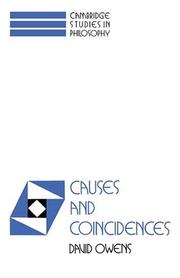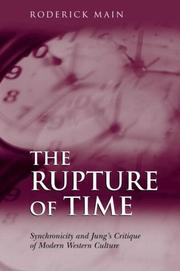| Listing 1 - 3 of 3 |
Sort by
|

ISBN: 0521416507 0521044480 0511520069 Year: 1992 Volume: vol *14 Publisher: Cambridge : Cambridge University Press,
Abstract | Keywords | Export | Availability | Bookmark
 Loading...
Loading...Choose an application
- Reference Manager
- EndNote
- RefWorks (Direct export to RefWorks)
In an important departure from theories of causation, David Owens proposes that coincidences have no causes, and that a cause is something which ensures that its effects are no coincidence. In Causes and Coincidences, he elucidates the idea of a coincidence as an event which can be analysed into constituent events, the nomological antecedents of which are independent of each other. He also suggests that causal facts can be analysed in terms of non-causal facts, including relations of necessity. Thus, causation is defined in terms of coincidence, and coincidence without reference to causation. David Owens challenges the ideas associated with Hume, Davidson and Lewis, constructing a theory which distinguishes nomological necessity and sufficiency from their logical counterparts. He is able to offer novel solutions to the major problems of causation, including the direction of causation, the logical form of causal statements, the distinction betwen causal connections and logical connections, and the relationship between psychological and physical causation.
Causaliteit --- Causalité --- Causation --- Coincidence --- Gelijktijdigheid --- Oorzakelijkheid --- Simultanéité --- Coïncidence --- Simultaneousness --- Synchronicity --- Synchronism --- Chance --- Simultaneity (Physics) --- Causality --- Cause and effect --- Effect and cause --- Final cause --- Beginning --- God --- Metaphysics --- Philosophy --- Necessity (Philosophy) --- Teleology --- Causation. --- Coincidence. --- Causalité --- Coïncidence --- Arts and Humanities
Book
ISBN: 3458160841 Year: 1989 Publisher: Frankfurt a.M. Insel Verlag
Abstract | Keywords | Export | Availability | Bookmark
 Loading...
Loading...Choose an application
- Reference Manager
- EndNote
- RefWorks (Direct export to RefWorks)
Coincidence --- -Harmony (Aesthetics) --- -Harmony (Aesthetics) in literature --- -Harmony (Aesthetics) as a theme in literature --- Aesthetics --- Simultaneousness --- Synchronicity --- Synchronism --- Chance --- Simultaneity (Physics) --- Congresses --- Conferences - Meetings --- Harmony (Aesthetics) in literature --- Harmony (Aesthetics) --- Harmony (Aesthetics) as a theme in literature

ISBN: 1583912282 0203501462 9780203501467 9781135453121 1135453128 1138011924 1280078677 9781135453084 9781135453138 9781583912287 9781138011922 9781280078675 Year: 2004 Publisher: Hove ; New York : Brunner-Routledge,
Abstract | Keywords | Export | Availability | Bookmark
 Loading...
Loading...Choose an application
- Reference Manager
- EndNote
- RefWorks (Direct export to RefWorks)
Why was the idea of synchronicity so important to Jung?Jung's theory of synchronicity radically challenges the entrenched assumptions of mainstream modern culture in the West. It is one of the most fascinating yet difficult and discomfiting of Jung's psychological theories.The Rupture of Time aims to clarify what Jung really meant by synchronicity, why the idea was so important to him and how it informed his thinking about modern western culture. Areas examined include:* how the theory fits into Jung's overall psychological model and the significance of its apparen
Civilization [Modern ] --- Psychological aspects --- Coincidence. --- Psychoanalysis and culture. --- Civilization, Modern --- Culture and psychoanalysis --- Culture --- Simultaneousness --- Synchronicity --- Synchronism --- Chance --- Simultaneity (Physics) --- Psychological aspects. --- Jung, C. G. --- Jung, Carl Gustav --- Jung, Karl Gustav, --- I︠U︡nh, Karl Hustav, --- Jung, Carl Gustav, --- Yung, Ḳ. G. --- Yungu, C. G. --- I︠U︡ng, Karl Gustav, --- יונג, קרל גוסטאב --- יונג, קרל גוסטב --- יונג, ק. ג. --- 榮格, --- C. G. ユング, --- Yūng, Kārl Gustāv, --- يونگ، کارل گستاو
| Listing 1 - 3 of 3 |
Sort by
|

 Search
Search Feedback
Feedback About
About Help
Help News
News